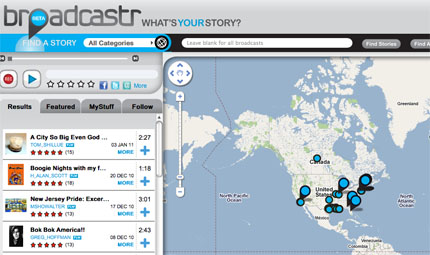Developers in Brooklyn, New York are working on a platform that allows people to upload audio stories and geolocates them on a world map.
Broadcastr, which the developers describe as ‘a social media platform for location-based stories’, launched recently in beta.
The service is similar to the UK-based audio platform AudioBoo in terms of geolocation, but it is different in that Broadcastr’s site is entirely based on a world map.
The beta site already includes eyewitness reports from the Brisbane floods, and the site is working with Human Rights Watch in Egypt to encourage audio uploads.
Speaking to Journalism.co.uk, spokesperson Kate Petty said that in cases where a country’s internet is blocked, Broadcastr could set up a voicemail service for witnesses to leave messages via a phone rather than uploading them directly to the website. Petty likened the facility to a similar response from Twitter’s when the internet was blocked during anti-government protests in Egypt.
Asked if broadcasters can use the audio reports, she explained that the contributor keeps the copyright but said the site makes it clear to those uploading audio that they are offering it up to an open community.
Petty added that it would take at least six months before the full site could be released. Free iPhone and Android apps will also be available.
Co-founder and president of Broadcastr (and former snowboarder) Scott Lindenbaum acknowledged they are not alone in developing audio-based social media applications. “The start-up space is competitive, like snowboarding, and you want to be successful, but it’s also about seeing what’s possible, and advancing the community as a whole.”
Andy Hunter, co-founder and CEO added: “Just like Facebook proved that our friends are important, Broadcastr will prove that our neighbourhoods are important.”
Petty was unable to reveal the cost of creating the startup, but said it is currently funded by developers’ friends and family.

